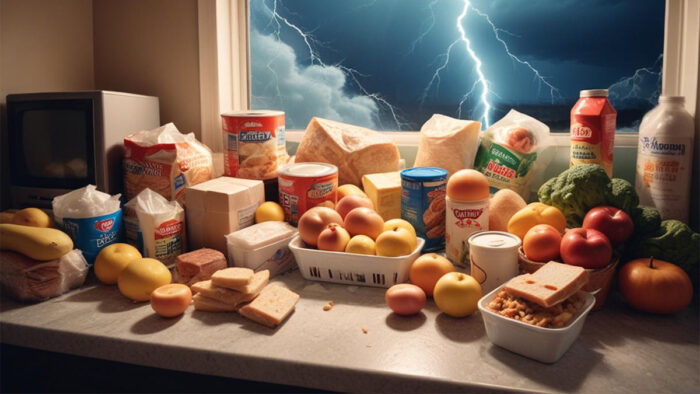Home insurance typically does cover spoiled food after a power outage, but this depends on the cause of the outage and your specific policy. If the power outage is due to a covered event, such as a storm or other natural disaster, your insurance may reimburse you for the cost of spoiled food.

However, if the outage is caused by something not covered by your policy, such as a power company’s equipment failure or scheduled maintenance, your insurance may not cover the loss. Additionally, keep in mind that there may be limits to the coverage, such as a maximum dollar amount or a deductible you need to meet before coverage kicks in.
It’s important to check your policy details and contact your insurance provider to confirm the coverage and any limitations before filing a claim for spoiled food due to a power outage.
When Does Home Insurance Cover Spoiled Food?
Home insurance typically covers spoiled food when the loss is a direct result of a covered event, such as a natural disaster or an accident. Here are some examples of situations where your homeowner’s insurance might cover spoiled food:
- Power outages due to storms: If a severe storm, hurricane, or other natural disaster causes a power outage that results in spoiled food, your homeowner’s insurance will likely cover the loss, as these events are generally covered by standard policies.
- Electrical failures or malfunctions: If a sudden electrical failure or malfunction within your home causes your refrigerator or freezer to stop working, the resulting spoiled food may be covered by your homeowner’s insurance.
- Accidental damage: If you accidentally damage your refrigerator or freezer and it results in spoiled food, your homeowner’s insurance may cover the loss, depending on the specifics of your policy.
It’s essential to review your homeowner’s insurance policy and understand the covered events and any limitations to ensure you know when spoiled food might be covered.
Does Homeowners Insurance Cover Food Loss From a Broken Refrigerator?
Homeowners insurance may cover food loss from a broken refrigerator, depending on the cause of the damage and the specifics of your policy. Here are a few scenarios to consider:
- Sudden and accidental damage: If your refrigerator breaks down due to sudden and accidental damage, such as an electrical failure or a falling object, your homeowner’s insurance is likely to cover the loss of food.
- Damage caused by a covered event: If the damage to your refrigerator is caused by a covered event, like a fire, storm, or other natural disaster, your homeowners insurance may also cover food loss.
- Wear and tear or lack of maintenance: If the refrigerator breaks down due to wear and tear, lack of maintenance, or gradual deterioration, homeowners insurance is unlikely to cover food loss, as these types of damage are generally excluded from standard policies.
Additionally, consider the value of the spoiled food and your policy’s deductible to determine if filing a claim is worth it.
When Does Home Insurance not Cover Spoiled Food?
While homeowners insurance may cover spoiled food in certain situations, there are instances where coverage is not provided. Here are some scenarios when homeowners insurance may not cover spoiled food:
- Power outages not caused by covered events: If a power outage is due to a non-covered event, such as a power company’s equipment failure or routine maintenance, your homeowner’s insurance will likely not cover the loss of food.
- Gradual deterioration or wear and tear: If your refrigerator or freezer breaks down due to gradual deterioration or lack of maintenance, homeowners insurance generally won’t cover spoiled food, as these types of damage are typically excluded from standard policies.
- Intentional damage: If the damage to your refrigerator or freezer is intentional or caused by negligence, homeowners insurance will not cover the resulting food loss.
- Spoilage due to leaving food out: If food spoils because you left it out of the refrigerator or freezer for too long, homeowners insurance will not cover the loss.
Always check your homeowner’s insurance policy to understand the covered events and exclusions to avoid any surprises when dealing with spoiled food.
Frequently Asked Questions
How do I know if my policy covers spoiled food?
Review your homeowner’s insurance policy and look for coverage related to refrigerator or freezer contents. If you’re unsure, contact your insurance agent to clarify your coverage.
What should I do with spoiled food after a power outage?
Keep a list of the spoiled items and take photos as evidence. Safely dispose of the spoiled food and keep receipts for any additional expenses related to the food loss.
Is there a deductible for spoiled food claims?
Yes, your homeowners insurance deductible applies to spoiled food claims. Determine if the value of the lost food exceeds your deductible before filing a claim.
How do I file a claim for spoiled food?
Contact your insurance agent or company to report the loss and provide details about the incident. They’ll guide you through the claims process.
How much will my insurance reimburse for spoiled food?
Reimbursement depends on your policy limits and the value of the lost food. Most policies have a coverage limit for refrigerator and freezer contents, typically ranging from $500 to $1,000.
Does renters insurance cover spoiled food after a power outage?
Yes, renters insurance may also cover spoiled food due to power outages caused by covered events, similar to homeowners insurance. Review your renter’s insurance policy for details.
How can I prevent food spoilage during a power outage?
Keep your refrigerator and freezer doors closed to maintain temperature. Use coolers with ice or ice packs for perishable items, and consider investing in a generator for prolonged outages.
What happens if my insurance doesn’t cover spoiled food?
If your homeowners insurance doesn’t cover spoiled food, you’ll be responsible for replacing the lost items at your own expense. Check your policy for other potential coverages, such as appliance repairs or replacements.



